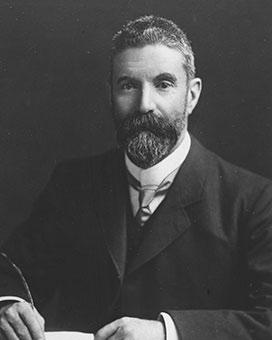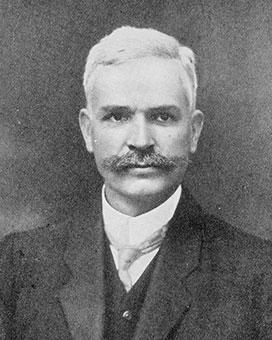John Christian Watson remained in parliament for 6 years after his government fell in 1904, though he resigned the leadership of the party in 1907. Watson remained active in party politics until he was expelled for his support of conscription in 1917. From then Watson’s energies were directed to the establishment of the National Roads and Motorists Association (NRMA) and the cause of protective tariffs. He also acquired a significant portfolio of company directorships.
Watson was Leader of the Opposition during George Reid’s prime ministership (18 August 1904 to 5 July 1905). For the next 3 years, Alfred Deakin’s Protectionists were in office. Watson led Labor in a fluid and frustrating alliance with the Protectionists, while Reid’s Anti-Socialist Party was in Opposition.
Watson won the South Sydney seat at the third federal election, in December 1906. His rural seat of Bland had been abolished in a redistribution. Citing ill-health and his wife’s wishes, Watson resigned as leader of the federal parliamentary Labor Party on 24 October 1907. Andrew Fisher became the second to hold this post.
Throughout Deakin's second term as Prime Minister (1905–08), Watson was vital in maintaining an alliance of Protectionists and Labor on the tariff issue. Deakin’s ‘new protection’, influenced by Watson’s key role in managing the numbers, resulted in ‘experimental’ protective tariffs with imperial preferences, enacted in the Customs Tariff Act 1908.
Watson held his South Sydney seat in the federal election in December 1908. Although Labor was returned to government, Watson did not seek a ministry in Andrew Fisher’s new government. In April 1910, Watson retired from parliament and did not contest the fourth general election on 13 April 1910.
Aged only 43 when he left parliament, Watson pursued various business ventures and became director of some companies, including Labor Papers Ltd. From 1910 to 1916, Watson devoted most of his energies to the Australian Workers Union (AWU). He served on the New South Wales executive of the Australian Labor Party in 1910–11 and 1913–15.
In 1915, with his wife Ada Watson, he visited England and the United States and reported on war matters to Prime Minister Andrew Fisher on their return. At this time, Watson also first advocated a scheme to settle returned soldiers and their families on rural land allotments.
Watson remained an active member of the Australian Labor Party until the conscription split in 1916. Both he and William Hughes were expelled for their support of conscription against party policy. Watson then assisted Hughes in forming the National Party in 1917. From the 1920s, however, he was involved in organisations such as the Australian Industries Protection League, rather than party politics.
Watson was a founder of the New South Wales Roads Association in 1920. He served as president of this body and its successor, the National Roads and Motorists Association (NRMA), for 20 years. His company directorships in the inter-war period included Brisbane Metal Quarries, Alexandria Spinning Mills, Yellow Cabs of Australia and Australian Motorists Petrol Co. Ltd (Ampol). He had been the founding chairman of Ampol.
John Christian Watson died, aged 74, on 18 November 1941 in his home in Double Bay, New South Wales. He was survived by Antonia Watson, his second wife, and by their 14-year-old daughter, Jacqueline, who continued to occupy the family home until 1996.

Chris Watson organised an employment scheme for returned soldiers in 1916. NAA: A2, 1916/3631, p. 30
Sources
- Crisp, LF, Australian Federal Politics and Law, Melbourne University Press, Melbourne, 1956.
- McMullin, Ross, The Light on the Hill: The Australian Labor Party 1891–1991, Oxford University Press, Melbourne, 1991.
- Nairn, Bede, ‘John Christian Watson’ in Australian Dictionary of Biography, Vol. 12
From the National Archives of Australia collection
- Hon. JC Watson (appointment as organiser re scheme to provide employment for Returned Soldiers) 1915–17, NAA: A2, 1916/3631
- Condolences [and arrangements for state funeral] – Hon. JC Watson, 1941–42, NAA: A461, 700/1/452





